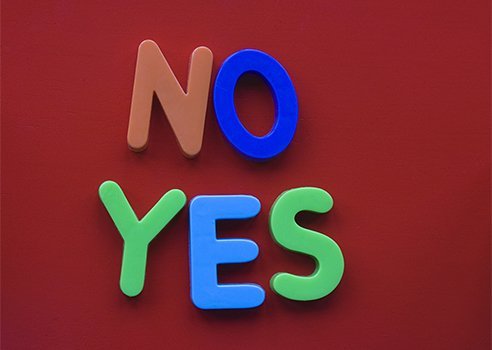Reading time: Less than 3 minutes
There are five excellent reasons why you should say yes to writing more often.
Here is a real-life email from one of my potential clients who wants to write for the theatre. It said: “I’ve put a hold on my play. I’m afraid of the “let down” when I realize that it will never be produced. It’s a shame because I think I have some good ideas.”
I’d been corresponding with the writer for close to a year and I emailed her back right away, asking permission to address her issue in this column. She agreed and here is what I want to say to her:
Sweetheart, this is so sad. I think you’re making a mistake and I ask you to reconsider your decision. Here are five reasons why:
1) How do you know your play will never be produced? Do you have ESP? A hotline to the supernatural? Awesome psychic powers? The bottom line is of course you don’t know this. You’re guessing. Psychologists know that when people use words like “always,” “never,” “all the time” and “forever,” they’re engaging in absolutes. Usually this is because they’re afraid of something or feeling inadequate or awash in doubt. Any marriage counselor would tell you to stop talking like this because it will damage your relationship. So I suggest you begin by editing this sentence and changing it to something more realistic. Perhaps you want to say: I think it’s unlikely my play will be produced. Can you live with that? It sounds much more reasonable to me and yet it still leaves some room for hope.
2) The theatre world may change. Before you tell me that’s ridiculous, think about how much reading has changed over the last ten years. Did you own an e-reader 10 years ago? Did you use to read a daily newspaper? Do you now? How often do you go to the library? Then consider music. Remember LPs? CDs? How long have you had an iPod or an iPhone? When was the last time you actually paid for music? Fundamental shifts happen all the time. We’re just not very good at seeing them when we’re in the middle of them. I can’t predict what might happen with the theatre world, but neither can you. And that’s the point.
3) You can’t do something with nothing. If you don’t write the play, you won’t be able to edit it and — in that case — it certainly won’t ever get produced. By not writing, you’re not actually protecting yourself from being “let down.” You’re guaranteeing it. (Isn’t that weirdly ironic?) There’s a technical term for this: self-fulfilling prophecy.
4) Thinking about publishing a piece of writing, while you’re writing, stifles your creativity. This relates to the left-right brain continuum. If your logical, linear left-brain is in charge, your profoundly creative right brain can’t operate. It shuts down, period. Don’t let yourself think about publishing (or producing) while writing. That’s a job for the editing brain. Write first. Worry about editing and publishing later.
5) The act of writing your play will change you, deeply. You’ll be a different person by the time you finish it. Don’t you want to know more about that person? Aren’t you the least bit curious? You’ll not only write the play, but the play will write you.
Author Tom Rachman started his working life as a foreign correspondent but he wanted to write a novel. He quit his job and spent a year doing it. The novel was terrible and didn’t get published. But it taught him how to write. A few years later he produced a fabulous bestseller The Imperfectionists. “My previous attempt hadn’t produced a book, but it had honed my technique,” he says. “I stopped fretting about whether I possessed the skill to become a writer, and focused instead on the hard work of writing.”
I have enough friends in the theatre business to know one thing for sure: Directors always tell improvisational actors to say “yes” to everything. If another character on stage says, “I feel sick,” you don’t say “why?” or “no you don’t.” Instead, you say “let me get you a cold cloth for your forehead.” Saying “yes” allows the scene to continue.
For this reason, I suggest you say yes to your play. It’s risky. It means investing some time, and possibly, failing. With “no”, of course, there’s zero risk of failing.
But there’s also zero chance of success.
What’s the biggest challenge you have with saying yes? How do you deal with it? We can all learn from each other so, please, share your thoughts with my readers and me in the “comments” section. (If you don’t see the comments, go here and then scroll to the very end.) And, congratulations to Jim Hayward, the winner of this month’s book prize, 100 Things Every Designer Needs to Know About People for his July 10 comment on my blog. Anyone who comments on today’s blog post (or any others) by Sept. 30, 2014 will be put in a draw for a copy of the uplifting read, Outliers by Malcolm Gladwell.



